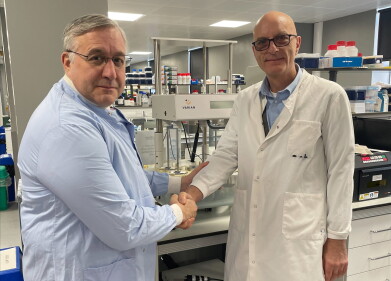News
Madeline Lancaster wins 2014 Young European Investigator Award
Jun 27 2014
The American scientist Madeline Lancaster, PhD (Marie Curie Postdoctoral Research Fellow, Laboratory of Jürgen Knoblich at the Institute of Molecular Biotechnology of the Austrian Academy of Sciences, IMBA, Vienna, Austria) has won the 2014 Eppendorf Award for Young European Investigators.
Madeline Lancaster, born 1982, receives the Eppendorf Award for her work showing that complex neuronal tissues resembling early states of foetal human brain can be created in vitro from pluripotent stem cells. Her groundbreaking experiments allow for the first time to recapitulate the development of brain structures in a three-dimensional organoid. Madeline Lancaster also documented that diseases caused by aberrant development such as microcephaly can be reproduced in the organoid culture. These discoveries allow for novel approaches towards the understanding of neurological diseases.
With the €15,000 Eppendorf Young Investigator Award which was established in 1995, Eppendorf AG honours outstanding work in biomedical research and supports young scientists in Europe up to the age of 35. The Eppendorf Award is presented in partnership with the scientific journal Nature. The Award winner is selected by an independent committee composed of Professor Reinhard Jahn (Max Planck Institute for Biophysical Chemistry, Göttingen, Germany), Professor Dieter Häussinger (Clinic for Gastroenterology, Hepatology and Infectiology, Düsseldorf, Germany), Professor Maria Leptin (EMBO, Heidelberg, Germany) and Professor Martin J. Lohse (Institute for Pharmacology and Toxicology, University of Würzburg, Germany).
The ceremony took place at the EMBL Advanced Training Centre in Heidelberg, Germany, on 22 May 2014. The laudation honouring Madeline Lancaster’s achievements was held by the jury chairman Professor Reinhard Jahn.
Madeline Lancaster: “The human brain exhibits dramatic evolutionary and developmental expansion, a process that has been difficult to examine in traditional animal models. In order to gain insight into this uniquely human process, my work focuses on the use of a 3D in vitro model system of human brain development, termed cerebral organoids, to examine regulators of brain size in the context of human evolution and neurodevelopmental disease.
This Award is a recognition of the potential of stem cell technologies to model human development and disease. It is a testament to the power of combining diverse fields to shed light on key questions, and it would not have been possible without the important contributions of our collaborators, and the supportive environment of the Knoblich group and IMBA.”
Digital Edition
ILM 50.2 March 2025
March 2025
Chromatography Articles - Effects of small deviations in flow rate on GPC/SEC results Mass Spectrometry & Spectroscopy Articles - Waiting for the present to catch up to the future: A bette...
View all digital editions
Events
Mar 31 2025 Beijing, China
Microbiology Society Annual Conference 2025
Mar 31 2025 Liverpool, UK
Apr 01 2025 New York, USA
Apr 02 2025 Saigon, Vietnam
Apr 09 2025 Tokyo, Japan




















